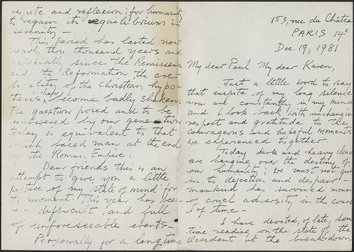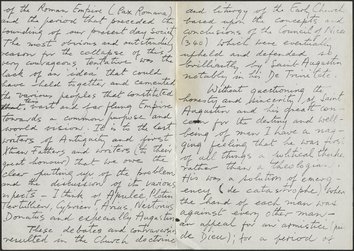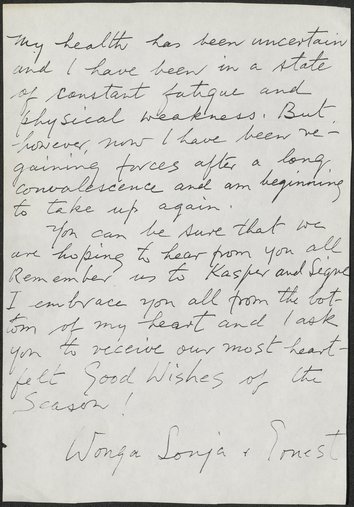Ferlov Mancoba
1981-12-19
Sender
Ernest Mancoba
Document content
Ernest Mancoba writes to Karen and Poul Vad about his thoughts on the society of the Western world. He compares the present with the time around the fall of Rome, drawing on readings of the Christian Church Fathers, particularly Augustine. He traces a spiritual crisis over the past 2000 years. He writes to share his thoughts and reflections with Poul and Karen Vad and to say that they are in his thoughts even though it has been a long time since he last wrote to them.
Machine-translated text
Transcription
153, rue du Château
PARIS 14e
Dec. 19, 1981
PARIS 14e
Dec. 19, 1981
My dear Paul My dear Karen,
Just a little word to say that inspite of my long silence you are constantly in my mind and I look back with unchanging respect and gratitude to the courageous and hopeful moments we experienced together.
Today dark and heavy clouds are hanging over the destiny of our humanity; we must not give in to dejection and despair – mankind has survived moments of cruel adversity in the course of time –
I have devoted, of late, some time reading on the state of the Occident at the break-down of the Roman Empire (Pax Romana) and the period that preceded the founding of our present day society The most obvious and outstanding reason for the collapse of this very courageous tentative vas the lack of an ‘idea’ that could have held together and cemented the various peoples that constituted that |this| vast and far flung Empire towards a common purpose and world vision. It is to the last writers of Antiguity and first Xtian Fathers and writers (to their great honour) that we owe the clear putting up of the problem and the discussion of its various aspects – I think of Apulée, Plotin Tertullien, Cyprien, Arius, Nestorius, Donatus and expecially Augustin.
These debates and controversies resulted in the Church doctrine and liturgy of the Early Church based upon the concepts and conclusions of the Council of Nicea (340) Which were eventually upheld and defended so brilliantly by Saint Augustin notably in his De Trinitate.
Without questioning the honesty and sincerity of Saint Augustin and his great concern for the destiny and wellbeing of man I have a nagging feeling that he was first of all things a political thinker rather than a theologian.
His was a solution of emergency (de catastrophe) when the hand of each man was against every other man – an appeal for an armistice (paix de Dieu); for a period of respite and reflexion; for humanity to regain its equilibrium in serenity –
This period has lasted now nearly two thousand years and especially since the Renaissance and the Reformation the credibility of the Christian hypothesis |has| become badly shaken. The question posed and to be answered by our generation today is equivalent to that which faced man at the end of the Roman Empire.
Dear friends this is an attempt to give you a little picture of my state of mind for the moment. This year has been very difficult and full of unforeseeable events –
Personally for a long time my health has been uncertain an I have been in a state of constant fatigue and physical weakness. But however now I have been regaining forces after a long convalescence and am beginning to take up again.
You can be sure that we are hoping to hear from you all Remember us to Kasper and Signe I embrace you all from the bottom of my heart and I ask you to receive our most heartfelt Good Wishes of the Season!
Wonga Sonja + Ernest
Facts
PDF
Letter
Engelsk
Dated in letter.
Machine-translated text
153, rue du Château
PARIS 14e
PARIS 14e
Apulejus fra Madaura
Arius
Cyprian
Nestorius
Plotin
Saint Augustine of Hippo
Tertullian
Kasper Vad
Signe Vad
Arius
Cyprian
Nestorius
Plotin
Saint Augustine of Hippo
Tertullian
Kasper Vad
Signe Vad
Ferlov Mancoba archive
Machine-translated text


